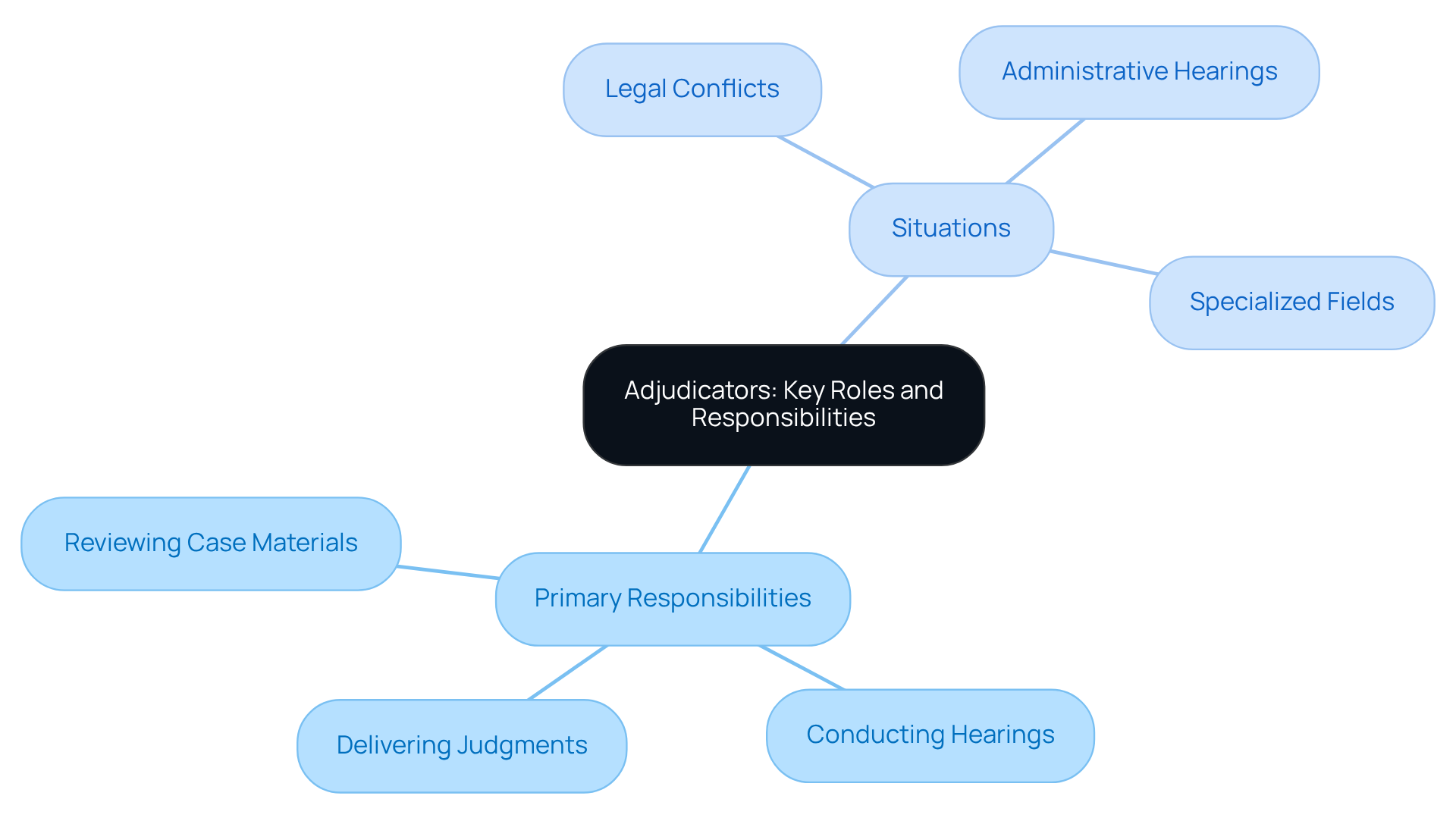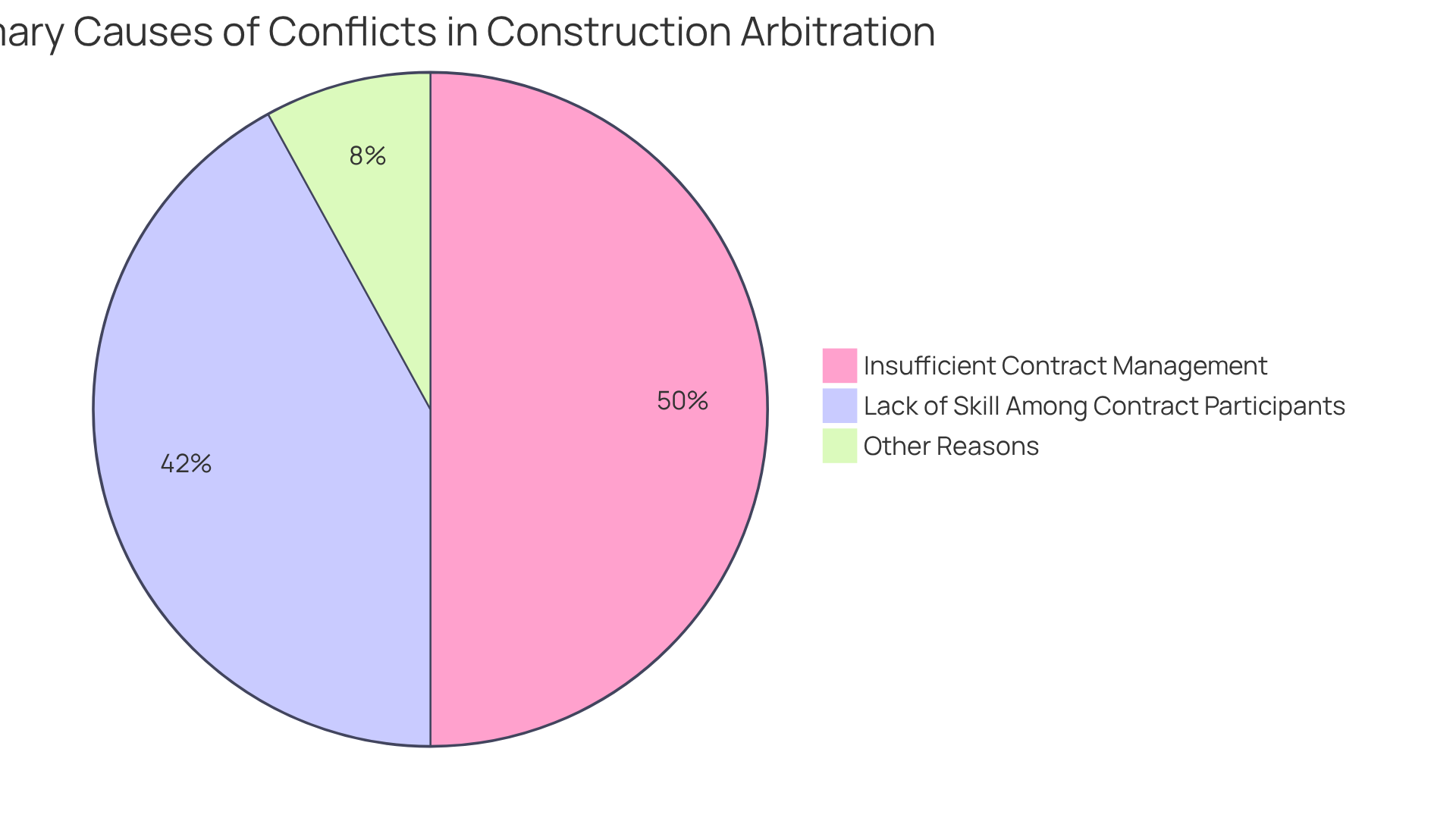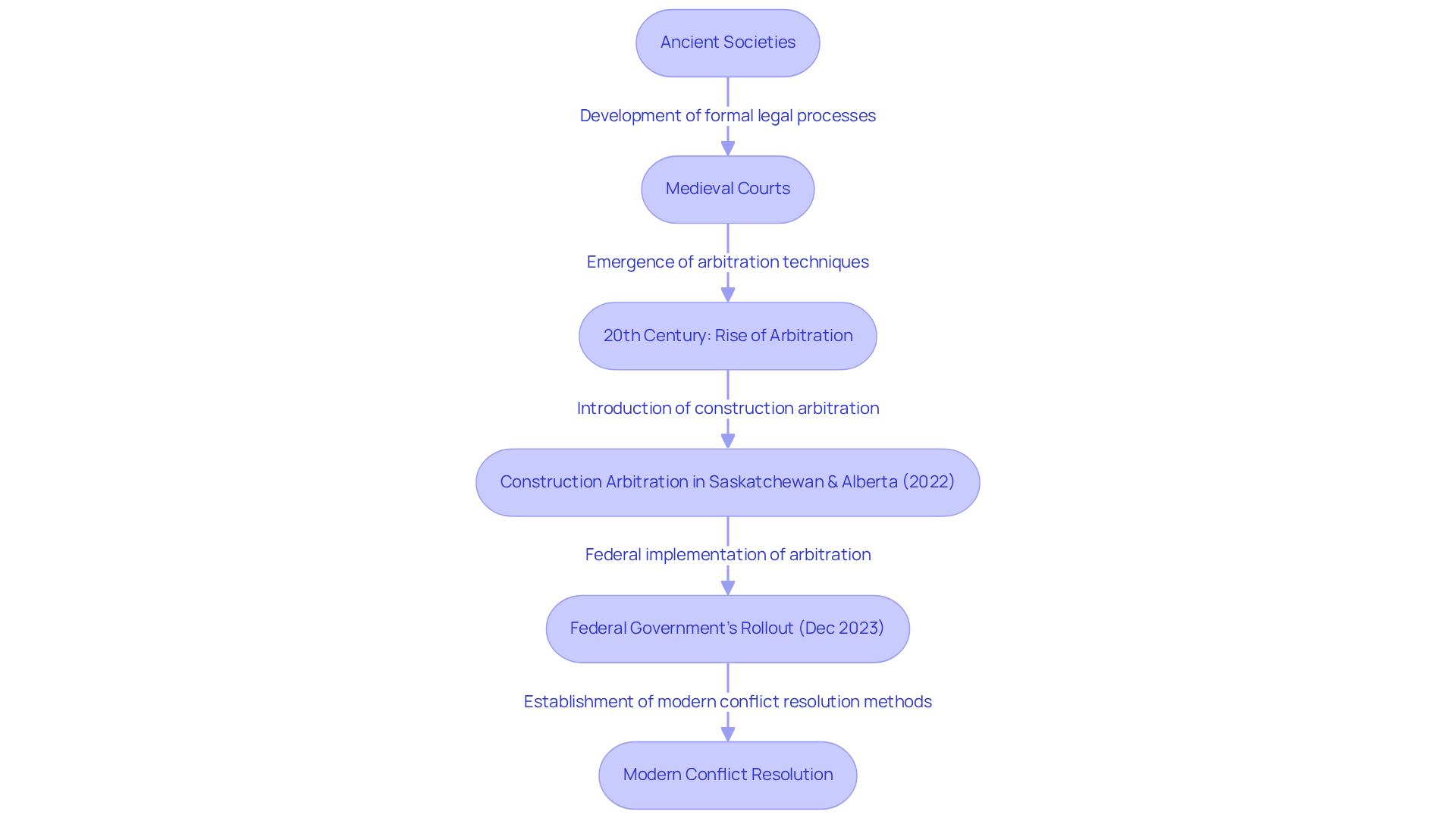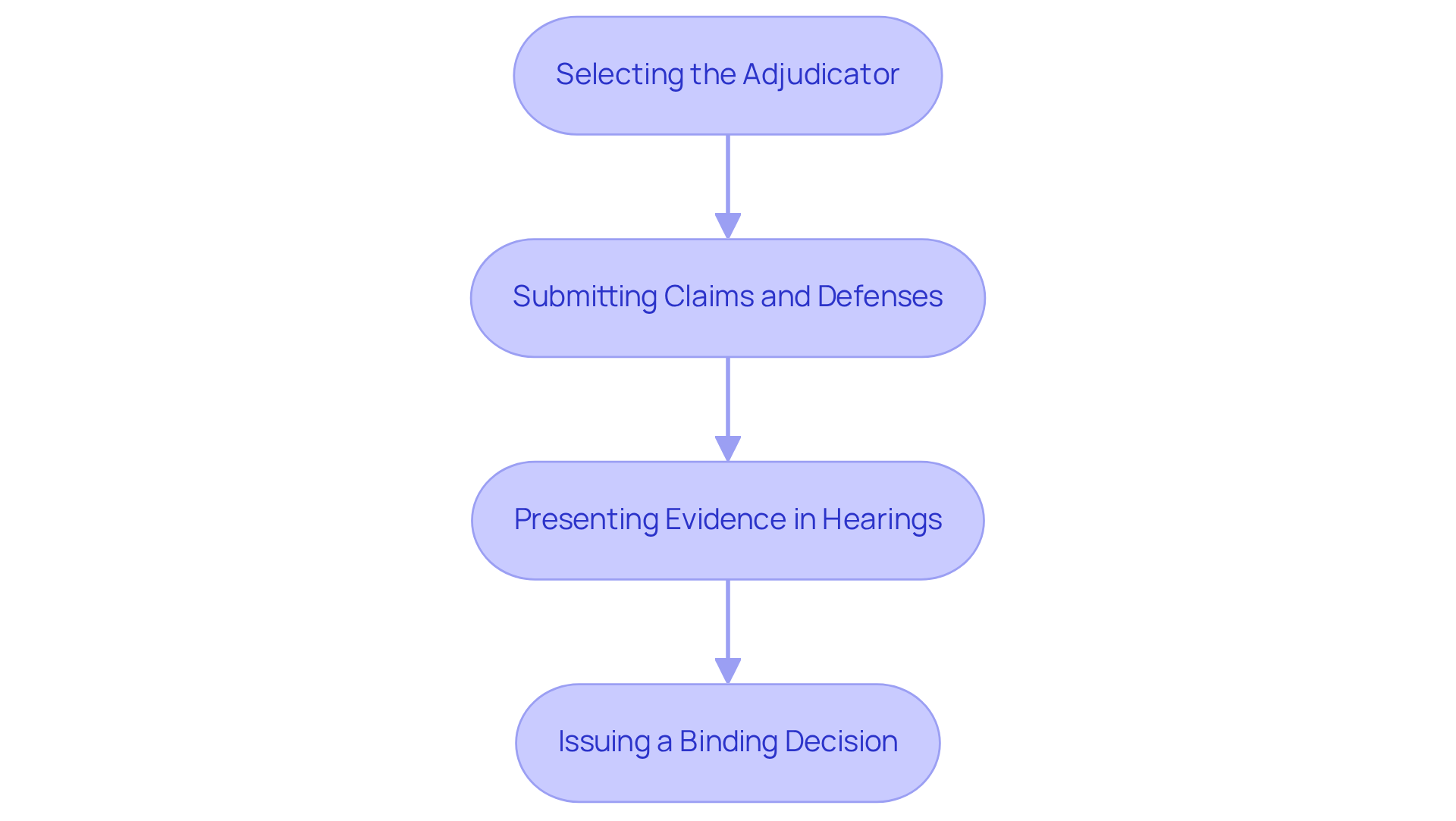
Adjudicators: Defining Their Role in Conflict Resolution
Overview
Adjudicators play a vital role in conflict resolution, serving as neutral third parties who make binding decisions based on evidence. They ensure that both parties feel heard and valued, which is essential for a fair process. Have you ever felt unheard in a dispute? It can be frustrating, but adjudicators are here to listen.
This article outlines their key responsibilities, such as conducting hearings and delivering enforceable judgments. These duties are crucial, especially in managing complex disputes. In sectors like construction, timely resolutions are essential to prevent delays and financial losses. Imagine the peace of mind that comes with knowing your dispute is being handled with care and urgency.
By understanding the importance of adjudicators, we can appreciate how they help navigate challenging situations. They not only resolve conflicts but also foster a sense of fairness and respect. If you find yourself in a dispute, consider the support that adjudicators can provide. Together, we can work towards a resolution that values everyone involved.
Introduction
Adjudicators play a crucial role as the impartial backbone of conflict resolution. They step in to guide disputing parties through the complexities of legal and administrative challenges. Their responsibilities extend beyond mere decision-making; they create an environment where individuals feel heard and respected. This nurturing approach ultimately leads to fair and binding outcomes.
However, as disputes grow increasingly intricate and urgent, we must consider: how can adjudicators adapt to meet the rising demand for swift and effective resolutions? This question invites us to reflect on the evolving landscape of conflict resolution and the essential role of empathy in fostering understanding and collaboration.
Define Adjudicators: Key Roles and Responsibilities
As neutral third parties, adjudicators are dedicated to settling conflicts with care and compassion. They are appointed as adjudicators to make binding decisions based on the evidence presented, ensuring that both parties feel heard and valued.
Adjudicators have primary responsibilities that include:
- Reviewing case materials
- Conducting hearings
- Delivering judgments that are enforceable by law
Imagine the relief of having someone impartial to guide you through the process, making it fair and transparent. Adjudicators offer both parties the chance to present their arguments, which fosters a sense of trust.
Adjudicators frequently function in diverse situations, such as:
- Legal conflicts
- Administrative hearings
- Specialized fields like construction or labor issues
This versatility highlights their importance in delivering prompt solutions. The choices made by adjudicators are generally conclusive, yet they can only be disputed in particular situations, underscoring the significance of their role.
In this journey, remember that the adjudicators are here to provide support, ensuring that the process is not only fair but also empathetic. Together, we can navigate these challenges with understanding and care.

Contextualize Adjudicators: Importance in Conflict Resolution
In conflict management, adjudicators play a vital role, particularly as disagreements grow more complex and varied. We understand that in sectors like construction, timely decisions are crucial to prevent project delays and financial losses. With a significant increase in adjudication referrals, including 1,789 arbitration cases pending resolution at the end of 2024, it's clear how essential adjudicators are in achieving swift outcomes.
By providing a structured approach to conflict management, adjudicators assist parties in avoiding the lengthy and often adversarial nature of court proceedings. This efficiency not only saves valuable time and resources but also encourages a more collaborative environment for resolving disputes. As organizations and individuals increasingly seek quicker resolutions, the demand for adjudicators is on the rise. With a planned £531 billion investment in infrastructure projects over the next decade, the reliance on their expertise is more pronounced than ever.
It's important to recognize the primary reasons for conflicts in construction arbitration, such as:
- Insufficient contract management (50%)
- A lack of skill among contract participants (42%)
These statistics highlight the crucial role of adjudicators in addressing these challenges. As Lord Justice Coulson aptly stated, arbitration is 'the only game in town' for most construction conflicts, highlighting the indispensable role of adjudicators in this sector.
Moreover, the enforceability of ruling decisions in English courts further enhances their effectiveness in conflict resolution. As the ICC is widely recognized as a preferred organization for international commercial and investment conflict management, we cannot overlook the significance of adjudicators in modern practices. Together, we can embrace their support in navigating these complex issues.

Trace the Origins: Historical Development of Adjudication
The beginnings of judgment can be traced back to ancient societies, where leaders and elders played crucial roles in settling conflicts among their subjects. These initial methods of conflict management were often casual, relying on the insight and influence of community leaders. As societies evolved, the mechanisms for resolving conflicts became more structured. The establishment of formal courts in medieval Europe marked a significant turning point, as judgment transformed into a recognized legal process governed by established rules and procedures.
In the 20th century, we witnessed the rise of alternative conflict management techniques, such as arbitration, emerging as a response to the growing backlog in traditional court systems. This evolution was driven by the need for more effective and accessible solutions, particularly in sectors like construction, where disputes frequently arise over payment and contract terms. Notably, the introduction of Construction Arbitration systems in Saskatchewan and Alberta in 2022, along with the Federal Government's rollout of Construction Arbitration in December 2023, reflects a growing acknowledgment of arbitration's relevance in modern conflict resolution.
Today, arbitration is widely recognized as a valid and efficient method for resolving conflicts across various sectors. It showcases flexibility and lasting significance in our contemporary society. Important advancements in decision-making include the implementation of legal frameworks, such as the U.K.'s Housing Grants, Construction and Regeneration Act of 1996, which established an organized approach for addressing issues in construction. This legislative support has been instrumental in the success of the initiative, allowing parties to receive decisions within weeks, thereby improving cash flow and reducing reliance on lengthy litigation. However, it's essential for advocates of government involvement in construction dispute management to remain cautious about potential downsides, as the decision-making process may not always align with the specific needs of those involved.
As the process continues to evolve, it remains a vital tool for conflict resolution, balancing the urgency for swift decisions with the complexities of modern legal challenges. Matthew Finn, Senior Managing Director at Conclude ADR, emphasizes the importance of problem-solving and partnership in client relations, highlighting the collaborative nature of effective decision-making.
In navigating these challenges together, we can foster a more supportive environment for conflict resolution, ensuring that every voice is heard and valued.

Explore Characteristics: Functions and Processes of Adjudicators
Adjudicators are crucial in resolving conflicts, distinguished by essential characteristics that enable them to effectively fulfill their responsibilities. These include impartiality, strong analytical skills, and clear communication abilities. Have you ever felt unheard in a dispute? The decision-making process is organized into several key stages:
- Selecting the adjudicator
- Submitting claims and defenses
- Presenting evidence in hearings
- Ultimately issuing a binding decision
Throughout these stages, the adjudicators strive to uphold neutrality, ensuring that both parties feel heard and respected.
Their choices are grounded in the merits of the case, legal principles, and pertinent evidence. This emphasizes the importance of their expertise in handling complex conflicts. This organized method not only enables rapid solutions but also establishes it as a favored approach for those seeking effective conflict resolution. Did you know that resolution methods can settle disagreements within just 28 to 42 days? That's considerably quicker than conventional litigation techniques.
Expert opinions highlight that the clarity and professionalism of adjudicators are paramount in their decisions. These qualities contribute to the integrity and effectiveness of the adjudication process across various sectors, including construction and administrative law. By choosing this path, you can feel confident that your concerns will be addressed with care and professionalism.

Conclusion
Adjudicators are vital in the realm of conflict resolution, serving as compassionate decision-makers who navigate disputes with fairness and understanding. Their role extends beyond merely delivering judgments; it involves fostering trust and ensuring all parties feel heard. This structured approach leads to swift resolutions, highlighting why adjudicators are indispensable in sectors like construction and legal disputes.
Throughout this article, we’ve explored the diverse responsibilities of adjudicators. From reviewing case materials and conducting hearings to issuing binding decisions that uphold the law, their multifaceted role is crucial. The historical evolution of adjudication reveals its growing importance, especially in our fast-paced world where timely decisions can prevent costly delays. As the demand for effective conflict resolution rises, the expertise of adjudicators becomes increasingly essential, ensuring conflicts are managed with care and justice.
In conclusion, we cannot overstate the importance of adjudicators in conflict resolution. Their ability to provide clear, enforceable decisions while nurturing a collaborative atmosphere is vital for fostering understanding and cooperation among all parties involved. As we navigate complex disputes in society, embracing the role of adjudicators will be key to promoting justice and efficiency in conflict management. Engaging with adjudicators not only streamlines the resolution process but also enhances the integrity of our legal and administrative systems, paving the way for a more harmonious future in dispute resolution.
Frequently Asked Questions
What is the role of adjudicators?
Adjudicators are neutral third parties appointed to settle conflicts by making binding decisions based on the evidence presented, ensuring that both parties feel heard and valued.
What are the primary responsibilities of adjudicators?
The primary responsibilities of adjudicators include reviewing case materials, conducting hearings, and delivering judgments that are enforceable by law.
In what situations do adjudicators commonly operate?
Adjudicators frequently function in legal conflicts, administrative hearings, and specialized fields such as construction or labor issues.
Can the decisions made by adjudicators be disputed?
The choices made by adjudicators are generally conclusive but can only be disputed in particular situations.
How do adjudicators contribute to the conflict resolution process?
Adjudicators provide an impartial perspective, guiding both parties through the process to ensure it is fair and transparent, fostering trust and understanding.


